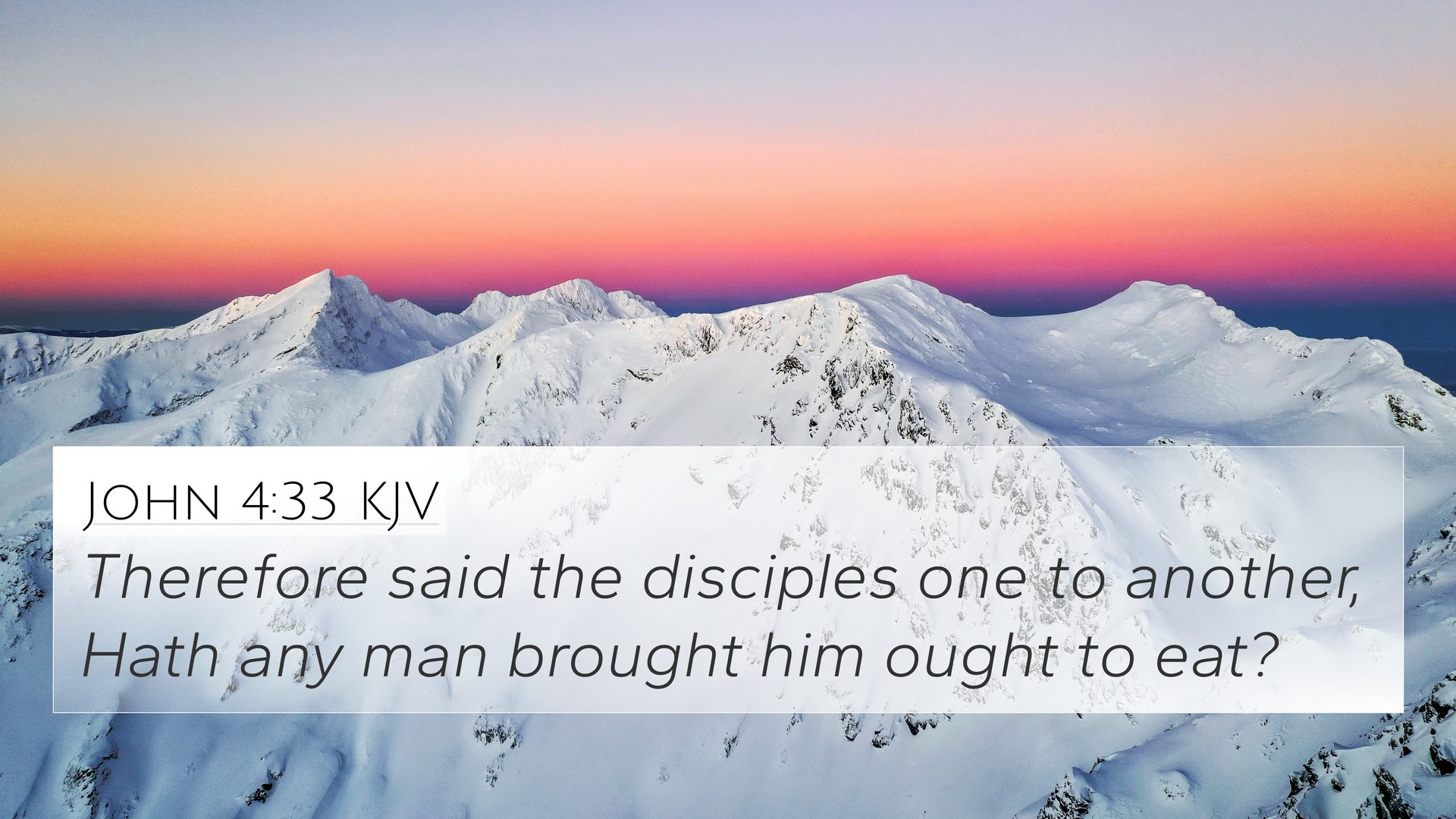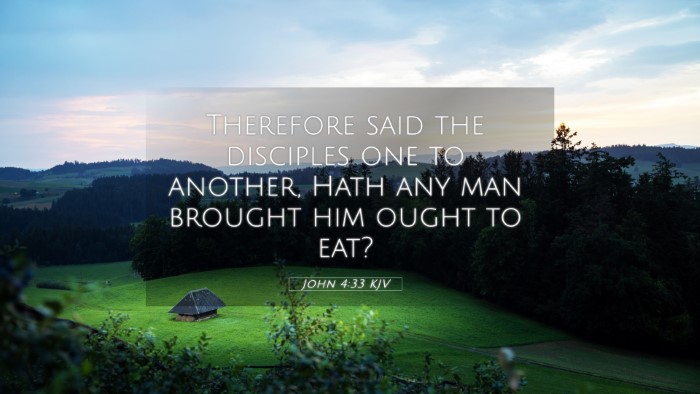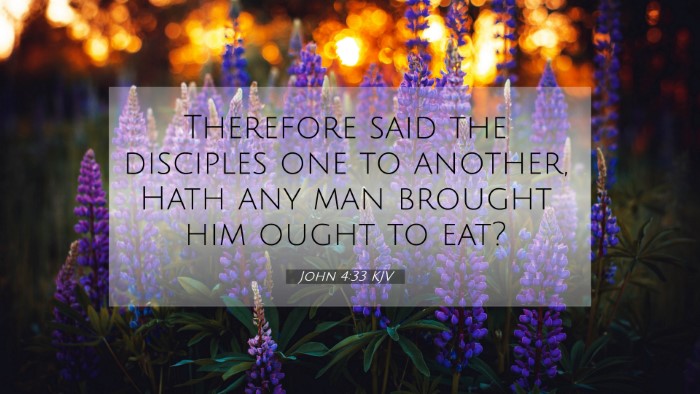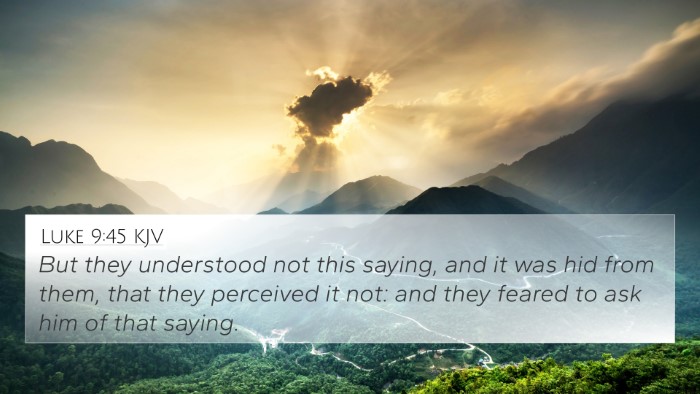Understanding John 4:33
John 4:33 states, "Therefore said the disciples one to another, Hath any man brought him ought to eat?"
This verse occurs in the context of Jesus’ conversation with the Samaritan woman at the well and reflects the disciples' confusion about Jesus’ physical needs versus His spiritual mission.
Contextual Overview
Jesus had just revealed profound truths about living water and worshiping in spirit and truth. The disciples return from buying food, and their inquiry shows a misunderstanding of the depth of Jesus’ ministry and His spiritual urgency.
Commentary Insights
-
Matthew Henry: Henry emphasizes that the disciples were concerned with physical nourishment while Jesus focused on spiritual sustenance. He points out that the disciples were often oblivious to the deeper lessons Jesus was teaching, illustrating a disconnect between their understanding of Jesus' mission and His divine purpose.
-
Albert Barnes: Barnes highlights the nature of the disciples’ misunderstanding as a representation of the broader spiritual ignorance that people often encounter. He suggests that this illustrates the tendency of humans to prioritize material needs over spiritual fulfillment. The question posed by the disciples also serves as a reminder of the need for vigilance in spiritual matters.
-
Adam Clarke: Clarke notes that the disciples might have expected Jesus to have human needs similar to their own, hence their inquiry. He also reflects on the larger theme of spiritual nourishment that surpasses physical needs, linking this narrative to broader Gospel themes regarding the prioritization of eternal truths over temporal ones.
Cross-References and Thematic Connections
Understanding John 4:33 can be enhanced by examining various other scripture verses that connect with its themes. Below are relevant Bible cross-references:
- John 6:27 - "Labour not for the meat which perisheth, but for that meat which endureth unto everlasting life." This verse emphasizes the need to seek spiritual nourishment.
- Matthew 5:6 - "Blessed are they which do hunger and thirst after righteousness: for they shall be filled." Highlights the spiritual hunger that leads to fulfillment.
- Luke 12:29-31 - "And seek not ye what ye shall eat, or what ye shall drink, neither be ye of doubtful mind." Encourages trust in God’s provision rather than fixation on physical needs.
- John 7:38 - "He that believeth on me, as the scripture hath said, out of his belly shall flow rivers of living water." Connects to the idea of spiritual sustenance through belief in Christ.
- Matthew 4:4 - "Man shall not live by bread alone, but by every word that proceedeth out of the mouth of God." Reinforces the theme of spiritual nourishment over physical needs.
- Romans 14:17 - "For the kingdom of God is not meat and drink; but righteousness, and peace, and joy in the Holy Ghost." Illustrates the superiority of spiritual riches.
- Colossians 3:2 - "Set your affection on things above, not on things on the earth." Encourages believers to prioritize spiritual matters over earthly concerns.
- John 4:14 - "But whosoever drinketh of the water that I shall give him shall never thirst." Directly relates to Jesus’ offer of spiritual sustenance.
- Philippians 3:19 - "Whose end is destruction, whose God is their belly, and whose glory is in their shame, who mind earthly things." Warns against prioritizing physical desires over spiritual realities.
- Psalm 63:1 - "O God, thou art my God; early will I seek thee: my soul thirsteth for thee, my flesh longeth for thee in a dry and thirsty land." An expression of spiritual longing.
Keyword Integration and Thematic Exploration
The primary message of John 4:33 and the surrounding verses is enriched through an analysis that connects various related Bible verses. This cross-referencing Biblical texts approach provides a comprehensive understanding of Jesus' teaching, which elevates spiritual nourishment above mere physical sustenance.
Such thematic Bible verse connections reveal how deeply intertwined the Gospel messages are concerning the pursuit of spiritual over physical needs. Tools for Bible cross-referencing can be invaluable in this exploration. By utilizing a Bible concordance or a cross-reference Bible study, individuals can effectively trace these inter-Biblical dialogues and uncover deeper spiritual truths.
Conclusion
John 4:33 invites readers to reflect on their own priorities regarding nourishment—both physical and spiritual. As users identify connections between Old and New Testament scriptures, they embark on a journey of deeper Bible study that enhances their understanding of Jesus’ mission and teachings. This verse serves as a vital link in a larger comparative study of Pauline epistles and other biblical texts, encouraging a heart aligned toward spiritual hunger and fulfillment.




